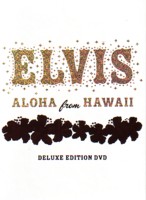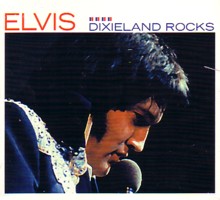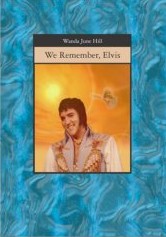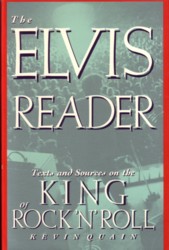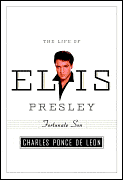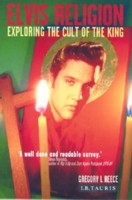Kathy Westmoreland, often introduced in concerts by Elvis Presley as "the little girl with the beautiful high voice" and nicknamed "Minnie Mouse" by him, sang soprano with Elvis from 1970 until 1977, replacing Millie Kirkham when she left to have surgery. For a long time Kathy kept quiet about the nature of her relationship with Elvis, but eventually was driven by impatience with the so-called Elvis experts and their "lies" to put her side of the story down in writing. Sounds familiar? This is the fourth book by a female author I've reviewed where the purported motive is to counter lies and misinformation and to provide a more balanced picture of Elvis Presley. All four books have quite a lot of common ground, although each have their own unique perspective. |
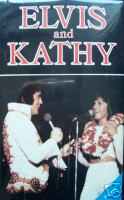 |
Some people may not like or agree with everything Kathy Westmoreland says, but they cannot deny that she had a place in Elvis's life. She was there during tours and also available over the telephone.
This is an interesting, if somewhat disorganised, account in twelve chapters of a seven-year-long professional and personal relationship. One chapter covers the nature of Elvis's and Kathy's relationship and another chapter talks involves fans and their extraordinary behaviour. Their antics reinforce the stereotype of the crazed Elvis fan, which we're all trying to dissociate ourselves from.
The book is not written chronologically and dates are hazy. The same topic may recur on different pages which makes it difficult to summarise. To make it more navigable, the book needs a table of contents and a good index.
Kathy had classical singing training. Despite misgivings about fitting in to Elvis's improvisational style of entertainment, she was soon made to feel at ease. Elvis disregarded the show business tradition of big stars not talking to their back-up singers or musicians, instead providing them, and especially newcomers, with welcome and encouragement. Kathy sang obligato - the high notes over the top of the songs.
There were good times and, later on, some bad times when the dark side of Elvis came to the fore. In 1975 he insulted Kathy and the Sweet Inspirations on-stage. All except Myrna Smith walked off in protest. This was the final straw in a series of incidents when Elvis insulted Kathy both off-stage and on-stage during introductions.
Kathy decided to leave the show at the end of the tour, but was persuaded by Tom Diskin to continue. She thought that something was seriously wrong, maybe with Elvis's health, to affect him that way. Elvis did not repeat the offensive behaviour and seemed to improve, despite what Red and Sonny West and Dave Hebler wrote in Elvis: what happened (1977). Elvis's and Kathy's friendship grew deeper through this experience.
The relationship between Elvis and Kathy was physical for a while, although there was no coercion. When Elvis first asked Kathy to stay the night, he told her that nothing would happen unless she wanted it to. Kathy found herself sleeping with Elvis every night without having sex for some time. While this may be hard for many males to believe, it seems to have often been the case with Elvis, if similar comments by other females are anything to go by. Elvis was rarely left alone at night from a young age. It is well known that he suffered from insomnia, nightmares and sleepwalking.
Once Elvis decided to end the relationship, Kathy had to decide whether to stay or go. She stayed on, partly for professional reasons, only to discover that, although she and Elvis were no longer "an item", he was still jealous of her having relationships with other men. However, they remained good friends and, later on, she found herself again sharing his bed without a physical relationship.
Kathy spends one whole chapter debunking myths, as well as commenting throughout the book on various topics. These are grouped under several headings and her comments are summarised.
Elvis the Giver
It's hard to find a positive book about Elvis that doesn't mention his generosity, and this book is no exception. In 1970 he said that his mission in life was to make people happy. He believed that the more you gave, the more you received. He believed in giving a tithe - one tenth - of his income to God and in paying his taxes to his country. He thought that his twin brother Jesse died because the family was too poor to obtain adequate medical treatment. So, when he had the money, he engaged a private doctor of his own and paid for medical treatment for others. He even provided limousines for the elderly around Memphis to get to church, the doctor and to market.
Spirituality and special powers
Elvis and Kathy had a similar interest in spiritual matters and he was pleased that they both liked the same kind of books, such as Joel S. Goldsmith's The intimate way and Kahlil Gibran's The impersonal life. According to Kathy, it was Elvis and Kathy singing "How Great Thou Art" together informally that made Elvis decide to put that gospel song into his show.
There have been accounts elsewhere of Elvis seeing shapes in the clouds. Here, Elvis is reported to have made a poodle-head shaped cloud disappear through concentration and meditation. Kathy saw other signs as time went on of Elvis's ability to meditate and use the power of prayer. She mentions that he had the gift of healing. Elvis also had a keen sense of hearing and an uncanny awareness of what was going on around him and when the situation was becoming dangerous. He would vary the pace of songs in concerts to control the mood of the audience. He once suddenly felt the need to call Grandma Dodger, to discover that she was sick. |
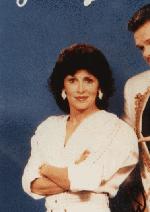 |
Politics
Elvis was primarily a strong conservative, tempered with a compassionate liberalism. He was patriotic to a fault and believed in giving back to his country a share of what had been given to him (so he was never involved in tax reduction, avoidance or minimisation schemes). He also thought it was important to support the President regardless of his political party. Elvis didn't think it was right to take a political stand in public on issues and use his influence to mould public opinion.
Sex and attitudes towards women
While Elvis was not a one-woman man, he was not as promiscuous as is often depicted. He was discerning and would share loving relationships when he met someone who interested him:- that interest would have to be mental as well as physical. Kathy soon found that an invitation to the bedroom did not imply a physical relationship. The bedroom was the place where Elvis could be alone (this opinion is echoed by other female writers).
Kathy had a Christian upbringing and was against premarital sex and adultery. She therefore had some soul-searching to do when her relationship with Elvis became physical. In her eyes, Elvis suffered from the old sexual double standard, typical of the 1950s, when he grew up. About Priscilla, Elvis said "We have given each other permission to have other relationships" and told Kathy that marriage was an outdated institution. At the same time, his ex-lovers remained his property and he was always jealous of their relationships with other men. But this didn't apply to him dating other women.
Kathy objected to Elvis's views on "training women" to please him. She would not have considered being his wife. Kathy was an independent person who wanted a career and would not share a husband with other women. Elvis wanted a woman who was at his beck and call. Even among professional spouses there can be difficulties about roles and expectations. Being a spouse of a superstar makes it several times worse. Kathy didn't see how long-term marriage with Elvis could have worked out for anyone, and she was right.
Weight and eating habits
Elvis was not enormously overweight. He had a twisted, enlarged colon. His abdomen was distended by fluid retention brought on by cortisone and antibiotics. This was not flabby fat caused by overeating.
Although Elvis was known to order a whole pound of bacon at a time, he rarely ate it all. They family had grown up so poor they couldn't afford bacon. He would rather have some to spare than send down further orders for more.
Similarly, the story is circulated that he ate three to ten banana splits at a time. Kathy says that there was only one occasion (when she was present) on which he ordered two banana splits. He used the ice-cream to cool his mouth which was sore from a yeast infection. He didn't eat the rest of the dessert.
Health problems and drug taking
Kathy attributes Elvis's drug taking to his many health problems and asserts that his drugs were prescription drugs. As mentioned, Elvis had serious problems, including an enlarged and twisted colon, hypertension, a weak and enlarged heart, diabetes, migraine headaches and pernicious anemia - "a cancer-like condition". He had to have fluid drained from his eyes regularly for glaucoma. When Elvis went to hospital, Kathy claims that it was not to dry out from drugs, but to adjust medications.
As has been pointed out before, some medications dispensed in Elvis's name and paid for by him were actually prescribed to others. Kathy thinks Elvis took what he needed to stay alive: he would have died sooner without it. Towards the end Elvis was terminally ill and everyone knew it, she says.
The persistent cancer theory, believed by so many of Elvis's friends and denied by others, could have its roots in the above-mention "cancer-like pernicious anemia". Elvis had several liver biopsies. He obviously suffered from a serious, not properly diagnosed or understood condition. As far as personal hygiene was concerned, Kathy says that Elvis took showers daily while performing. She is not convinced of his reported failure to wash properly as propounded by others. Certainly, showering seems to have been standard behaviour for most of his life. If there was a problem, maybe it should be put in the context of his later serious health problems. |
 |
Further, she asserts that Elvis never wore a diaper for incontinence - here again, the truth is hard to know. Are we talking about a specific incident? Was it after possible colon surgery (ileostomy) as suggested by Wanda June Hill (We remember, Elvis, 2006)? If so he might have needed a colostomy bag. Was it a diaper or some other form of medical dressing?
Memphis Mafia
Kathy seemed to get on reasonably well with the Memphis Mafia. Red West was on hand at one time to save Kathy from being dragged away by a crazy fan. But she was the scapegoat it the wives rang and a female answered the phone. Their excuse was "It's just Kathy" and Kathy had to play along with that.
The Memphis Mafia apparently received about two cars a year, houses, and other perks. When they had to work while on tour, they did so with a lot of grumbling. They were jealous of anyone close to Elvis and jealous of one another.
Kathy thought that the Memphis Mafia could also be spiteful at times. When Kathy was friendly with Lisa Marie, they told Elvis that Kathy was trying to get to him through Lisa, after which Lisa was told to have no further contact with Kathy. Kathy thought that this was particularly hard on Lisa, who seemed to be a lonely child. As stated, Kathy was not interested in marriage to Elvis.
The guys expressed impatience at Elvis's interest in various metaphysical topics and would leave the room saying "Not more of this shit!" Kathy considered the book "Elvis What Happened" by Sonny West, Red West and David Hebler contained many half-truths. She was of the opinion that, although Red was genuinely concerned about Elvis's health, he had no understanding of why Elvis was moody and over-medicating himself.
Tour logistics
Compared with other groups Kathy sang with, Elvis's tours and concerts were well organised. They had to be! The number of people traveling on tour included singers, band members, lighting men, stage riggers, soundmen, wardrobe people and hairdresser - at least 100 people. There were 3 planes for every tour: one for Col. Parker and his team who would travel ahead and set things in motion; a second for the singers and musicians; and a third for Elvis and his bodyguards.
The performers and crew required accommodation, transport and food. Kathy soon learned to carry snacks and a costume in her hand luggage in order to be ready for any emergency. If there was no time for a hotel before performing, the troupe might have to change on the plane. If 100 people descended on a restaurant hoping to be fed, members of the troupe sometimes pitched in to help with taking orders and cooking. Leaving hotels usually required a bus and 2 or 3 limousines with a police escort.
Loyalty test
At one point, Elvis staged a gun scare with blank bullets. It was JD Sumner who threw himself over Elvis while the bodyguards hit the floor and protected themselves first. Whether this was a test of their loyalty or just a practical joke, Elvis took serious note of their reactions.
Telephone use
It has been claimed that Elvis never made his own telephone calls and hated talking over the telephone. This wasn't strictly true. He asked others to put calls through when it meant having to go through a switchboard and chatting to operators. But when it came to calling friends directly, Elvis would telephone Kathy whenever the mood struck him, day or night, particularly when he was in any kind of trouble. (Although not mentioned in this book, there were other people he telephoned and talked to at length, such as Janelle McComb).
Origin of the TCB lightning bolt
One stormy night at Graceland Elvis was standing in front of a mirror in a fit of anger, seeing nothing but ugliness. Suddenly a bolt of lightning struck a marble statue in the meditation garden, leaving the name plate shattered in the form of a lightning bolt. Elvis interpreted this as a warning, as if God was putting him in his place. The lightning bolt was a symbol to remind him of who he was.
Graceland décor
Kathy expresses dismay at changes to the décor of the dining room since Elvis's death. Earlier, the colours were blue, then red, since changed back to blue.
In fact, blue was Elvis's favourite colour. In the 1960s, the entry hall, living room and dining room were carpeted in thick white, while the draperies in the living room and dining room were pale blue satin (Jenkins, Beyond Graceland Gates, 1997, pp. 59-67). Once Elvis and Linda Thompson were together, the house was redecorated, the red carpets and drapes reflecting Linda's taste. After Elvis's death, the house décor was changed back to blue. |
 |
Comment
Personally, I have more problems with some of Kathy Westmoreland's statements and robust rebuttals of various "untruths" than those of Wanda June Hill (We remember, Elvis, 2006), whom at least one of the Memphis Mafia denies any knowledge of. Kathy's relationship was physical as well as emotional. She counts herself as one of Elvis's "victims", whereas Wanda June Hill never did and is more dispassionate in her appraisals.
In particular, Kathy attacks the rumour that Elvis proposed marriage to everyone he met because he didn't propose to her. He certainly proposed to June Juanico in 1956 (Elvis: in the twilight of memory, 1997, p. 130). Elvis was a teenager in the 1950s. At that time, there was a strong moral attitude about sex only after marriage. By the time Elvis met Kathy in 1970, he was a man of the world.
It is impossible to cover every aspect of a book in a review - that's why you have to read it for yourself. Many women wanting a deep relationship with Elvis would have been disappointed. Kathy Westmoreland loved Elvis deeply and went through some emotional traumas adjusting to being only one of the many women in his life. She was determined not to be just another victim and came out the stronger for it. This is a touching and informative book, well worth the read.
Click to comment on this review
Read other book reviews by Susan MacDougall:
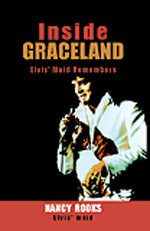 |
|


